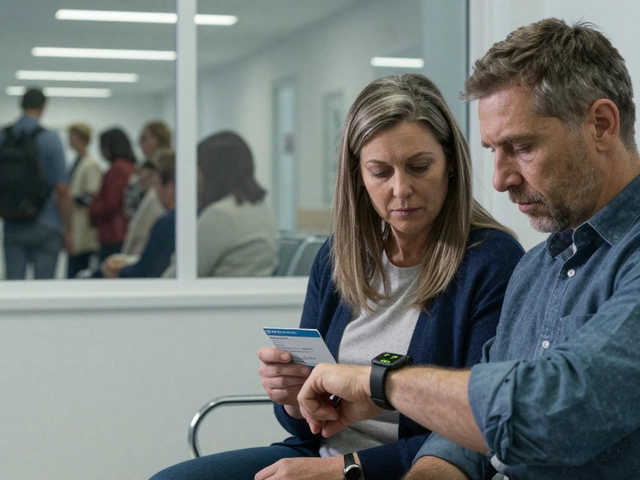Ever wondered what really happens if you dip your toes into private healthcare and then want to return to the NHS? The idea might sound simple—just switch back when you feel like it. But is it that straightforward? British people love the NHS, but with increasing waiting times and the complexity of referrals, more folks are looking at private care for solutions. Then the question pops up: If you pay for that MRI or see a private consultant for speed, are you locked out of the NHS after? The truth holds some twists, a few resources you should know about, and plenty of misunderstandings.
What Happens When You Switch From Private Back to NHS Care?
Here comes the thing nobody tells you upfront: you’ll never lose your right to NHS care, even if you get treatment or consultations privately. Legally and practically, every resident of the UK is still eligible for NHS services, no matter how much private healthcare they use. There’s no penalty—no mysterious blacklists. You don’t have to pay extra or prove hardship to get back in line. However, there are details that trip up plenty of people when it comes to actually navigating the process.
If you started a treatment privately, you can switch back to the NHS at pretty much any time. For example, a lot of people pay for a private MRI or see a consultant because NHS waitlists can be months long. Once they have results or a diagnosis, they hope to hand things over to the NHS system. But here’s a catch: when you switch back, you can’t expect the NHS to pick up where the private process left off, and you’ll often need to get a referral or repeat tests. Some NHS trusts accept private diagnostic results, especially if they’re recent, but there’s no guarantee. It depends partly on the local rules and whether the private provider’s methods matched NHS standards.
Another thing: switching can reset your spot on the waiting list. So let’s say you see a private GP and then want surgery with an NHS team. Your GP will need to refer you just like any other NHS patient, and you’ll likely join the queue from that point, not from the time you started private treatment. According to NHS England’s guidance updated for 2024, there’s no system for “fast-tracking” back because you paid for a private step.
The pathway isn’t the same for each medical specialty. For things like maternity care, urgent cancer treatment, and mental health, the NHS will step in to provide ongoing support even if you’ve started privately. But you might find private to NHS handovers smoother in some areas than others. A survey done last year by the Patients Association found that about 18% of people returning from private treatment had to repeat at least one diagnostic test when moving back into NHS pathways.
Your GP is key here. NHS GPs act as the “gatekeepers,” meaning all NHS hospital treatment has to be channelled through them. GPs can’t force consultants or hospitals to accept private test results, but they can write referrals or support you in transferring records. If you bring a private consultant’s plan or letter, hand it to your GP. Sometimes it makes the process faster, but don’t expect miracles.
| Scenario | Can You Switch Back? | Common Issues |
|---|---|---|
| Private MRI scan, then NHS surgery | Yes | Repeat tests possible, new waitlist position |
| Private consultant, then NHS ongoing care | Yes | Referral required, NHS may want own diagnosis/testing |
| Private cancer screening, want NHS treatment | Yes | NHS will accept urgent/critical cases quicker |
| Private prescription, NHS repeat | Yes | GP may review/verify medication plan |
Think of it like this: you’re always entitled to NHS care, but you can’t cherry-pick the fastest bits of both worlds all the time. If you want to make the most out of the switch, honesty and paperwork matter. Bring all private notes, test results, and consultant letters, and tell your NHS GP exactly what you’ve had done. It will save time and confusion in the long run.

Why People Switch Between NHS and Private Healthcare
So many people blend their healthcare between the NHS and the private sector nowadays. What pushes them? The top reason is definitely NHS waiting times. Let’s face it, nobody wants to wait 6–18 months to see a specialist, especially if there’s pain or uncertainty in the meantime. In March 2025, the median NHS waiting time for routine orthopaedic surgery was 24 weeks, compared to less than four for private clinics.
Then there’s the convenience factor. Private appointments often run on time, and you get longer slots to talk things over. Some people pay privately to get a fast diagnosis, then want to hand things off to the NHS for ongoing work or more costly surgery. Sometimes it’s about choice—the ability to pick your surgeon, or to access drugs or therapies the NHS doesn’t offer.
But private care isn’t a golden ticket. It’s expensive. A single private orthopaedic consultation can run £200–£300. An MRI scan might cost £300–£700. If you add up the costs for ongoing treatment, surgeries, or complex therapies, you’re looking at bills most people can’t cover without insurance.
Here’s a tip: some people use private medical insurance to bridge the gap. Insurers can cover everything from routine scans to major surgery, but they often still rely on NHS services for complex or rare treatments. And even with insurance, there can be exclusions, so you need to read the fine print. Private cover won’t protect you from having to return to the NHS for long-term follow-up or complex aftercare.
Another interesting fact: since the pandemic, there’s been a 37% surge in people paying out of pocket for single episodes of care according to figures published by the Independent Healthcare Providers Network (IHPN). That’s never happened before in the UK on this scale. People are moving back and forth more than ever.
Switching isn’t limited to surgery or cancer care. People regularly jump between private and NHS for mental health, reproductive medicine, dental, and even eye operations. Fertility treatment is a big one—NHS funding is patchy, so patients sometimes pay for cycles privately. But once pregnant, they move back to NHS maternity.
There’s still stigma in some circles about “going private.” But more and more people see it as just another tool. You don’t have to pick a side for life. The system is mixed, and most UK doctors work in both NHS and private practice anyway. That crossover keeps things familiar for patients hopping back and forth.
If you’re thinking about making the switch, here are a few tips to make it as smooth as possible:
- Keep all your private paperwork—scan and save letters, reports, and test results digitally so you can share them easily.
- Talk honestly to your NHS GP about your reasons for switching. Be upfront about what private care you’ve already had.
- If you want the NHS to take over, ask if they need to repeat any investigations. It’s better to find out early if you’ll need retesting.
- If you’re paying privately, check if your provider uses NHS-compatible tests and protocols. This can smooth a later transfer.
- Don't be afraid to ask questions about timelines, handover steps, and who will coordinate your care.

Navigating the Paperwork, Waiting Lists, and Handover Process
This is where it can really get confusing: the dreaded NHS waiting list. Returning to the NHS after private care isn’t as instant as people would hope. Here’s why: the NHS, for legal and practical reasons, maintains its waiting lists in date order based on referrals from NHS GPs. That means if you went private for a diagnosis, you’ll need a fresh NHS referral for treatment, and you’ll join the list from that new referral date—not from when you first noticed symptoms.
Say you paid privately for an MRI and it flagged a torn ligament. To get NHS surgery, your NHS GP still needs to see you, check your records, and formally refer you. You then wait like any other NHS patient. For high-priority issues—like suspected cancer or sight-threatening problems—the system tries to make things faster, but it’s never guaranteed.
Painful reality: NHS hospitals don’t have to accept or use private test results or scans, although most do if the reports are clear and come from CQC-regulated providers. Even so, some labs and clinics perform things differently. If the NHS can’t verify the tests meet their standards, you may get repeat scans, blood tests, or even further specialist opinions. It feels wasteful, but the reason is simple: NHS clinicians are responsible for your care, and they need confidence in the data.
This can be extra frustrating in cases where you’re desperate for speed. For example, if you have a private gastroscopy with a result suggesting coeliac disease, your NHS team might need their own biopsy, because treatment protocols rely on strict criteria. If you moved between private and NHS for something like cancer, your NHS team will push forward at their own pace and may want to repeat pathology or imaging for accuracy—and recordkeeping.
To help yourself along this whole handover dance, it’s worth learning how to chase up old records and keep a personal health file. Get both paper and digital copies. Some NHS systems are adopting electronic patient records that can accept private information, but uptake is patchy and varies by region.
There are times when your location matters massively. Scotland, Wales, and Northern Ireland sometimes have different procedures or rules for accepting private reports into the NHS than England does. Always ask, especially if you move cities or work with cross-border providers.
If you get stuck, you can ask for help from your GP surgery's patient liaison staff or a local Healthwatch group. They’re used to untangling paperwork and making sure private reports don’t sit forgotten in a pile. Some people also go to private clinics that offer "shared care" packages—these clinics actively coordinate with NHS teams to streamline your switch back. That can make a big difference if you’re managing a long-term chronic illness.
Here’s a quick look at common handover pain points and what you can do:
| Handover Issue | How to Help Fix It |
|---|---|
| Missing records or scans | Ask private clinic for digital and hard copies; give copies to GP |
| Referrals lost in system | Chase up with GP admin staff weekly; keep written log |
| Repeat tests required | Discuss with NHS provider if older results are usable |
| Conflicting treatment plans | Request care conference with consultant’s office |
If you’re prepared to be patient and willing to do a bit of admin, moving between NHS and private healthcare is totally doable. Remember, the NHS is always there for eligible UK residents, whatever care route you dip into. It just takes awareness, clear communication, and a solid plan to hop from one lane to another—and back!




